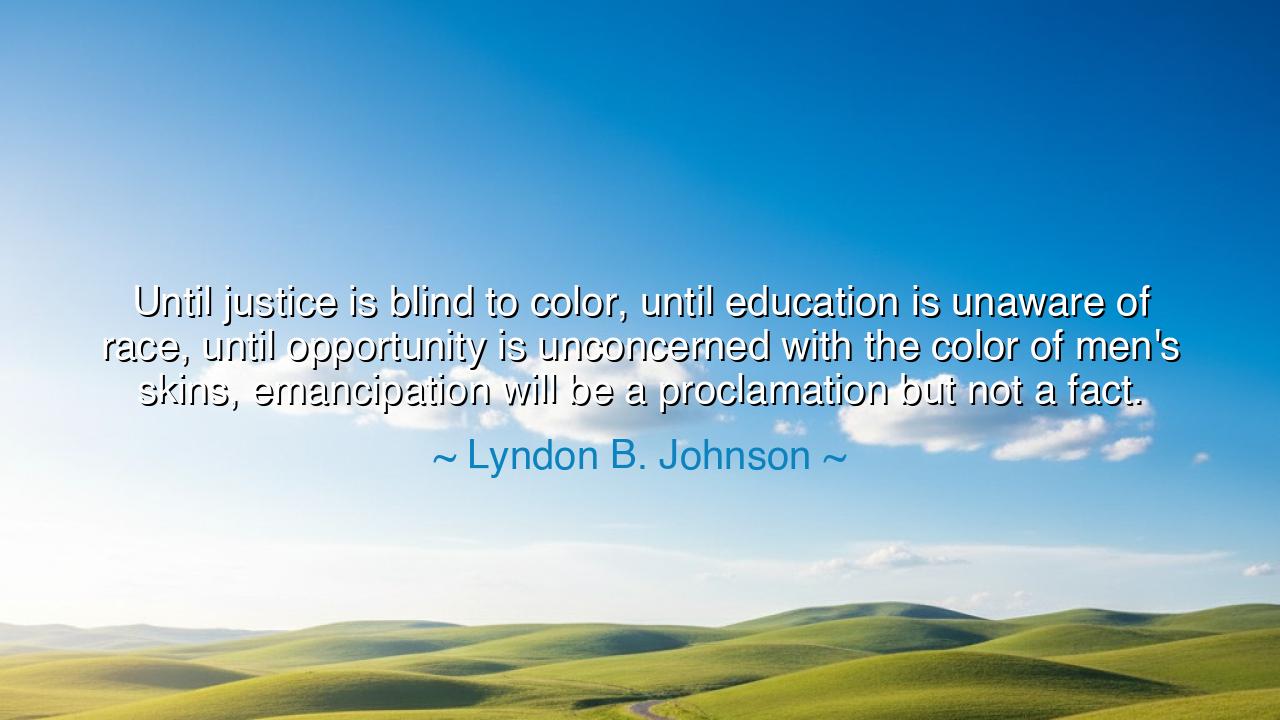
Until justice is blind to color, until education is unaware of
Until justice is blind to color, until education is unaware of race, until opportunity is unconcerned with the color of men's skins, emancipation will be a proclamation but not a fact.






"Until justice is blind to color, until education is unaware of race, until opportunity is unconcerned with the color of men's skins, emancipation will be a proclamation but not a fact." These powerful words were spoken by Lyndon B. Johnson, the 36th President of the United States, in an age when the fires of civil rights burned across the American land. They are not merely the speech of a politician—they are the lament and the vision of a man who understood that freedom declared is not the same as freedom lived. Johnson, speaking in 1965, sought to remind his nation that the Emancipation Proclamation of Abraham Lincoln had freed the body of the slave, but not yet the soul of a people still bound by inequality. True emancipation, he said, would come only when justice, education, and opportunity were cleansed of prejudice—when society itself became blind to color and awake to character.
To understand the weight of Johnson’s words, one must remember the time in which they were spoken. The Civil Rights Movement was at its peak. Men and women marched in Selma, Birmingham, and Washington, demanding not privilege, but equality. The law had ended slavery a century earlier, but the invisible chains of racism and segregation still bound millions. Schools were divided, jobs were withheld, and courts often saw justice through the eyes of color rather than conscience. Johnson, a man from the South himself, had witnessed this injustice not as an abstraction, but as a daily wound upon his country’s soul. His quote was a challenge to America to finish what Lincoln had begun—to make emancipation not just a word on parchment, but a truth in the hearts of men.
In saying that justice must be blind to color, Johnson invoked one of the oldest ideals of civilization. In ancient temples of law, the goddess Justitia was carved with a blindfold, holding scales in her hands—symbolizing fairness without favoritism. Yet for centuries, the scales of justice have been tipped by prejudice and privilege. When courts convict the powerless and pardon the powerful, when skin color shapes destiny, the blindfold of Justice is torn away, and the very idea of fairness becomes a lie. Johnson’s call was a call to restore the moral sightlessness of justice, that she might see not the hue of flesh but the truth of the human soul.
He also spoke of education—that sacred flame by which the young are guided toward understanding. In his time, Black children in America were often denied proper schooling or sent to crumbling institutions while white children learned in comfort. But Johnson knew that education, when poisoned by racism, corrupts the very spirit of learning. For how can the mind grow in wisdom if it is taught to despise others? The truest education, he said, must be unaware of race—it must see in every student not a color, but a possibility. Only then can knowledge serve as a ladder out of poverty and ignorance for all people, not just for a privileged few.
And finally, Johnson spoke of opportunity—that sacred right of every person to rise by merit, not by birth or bias. “Until opportunity is unconcerned with color,” he said, there can be no real freedom. History has proven him right. Consider the life of Thurgood Marshall, who rose from the shadows of segregation to become the first Black Justice of the United States Supreme Court. His triumph was not given; it was earned, wrested from a system that had tried to exclude him. His story is the embodiment of Johnson’s vision: that when barriers fall, greatness emerges, and the strength of a nation is revealed not in the oppression of some, but in the elevation of all.
Johnson’s words, though spoken generations ago, still echo in the present. For though laws may change, the hearts of men are slower to awaken. Racism hides not only in policies but in perceptions; inequality dwells not only in courts and schools but in minds and customs. The challenge remains—to make justice, education, and opportunity truly colorless, guided by character and not complexion. Only then will emancipation—that great promise of liberty—cease to be a proclamation and become a living, breathing fact.
So let this be the lesson to those who live now and to those yet unborn: do not mistake words for transformation, nor equality in law for equality in life. Strive to make your justice pure, your education humane, and your opportunity universal. See beyond the surface of skin to the truth of the spirit. For the measure of a society’s greatness is not in its wealth or armies, but in how it treats its most vulnerable. And when the day comes that color no longer divides, when education uplifts all, and when justice stands blind but not indifferent, then at last humanity will have fulfilled the dream that Johnson spoke—the dream of emancipation made real.






AAdministratorAdministrator
Welcome, honored guests. Please leave a comment, we will respond soon